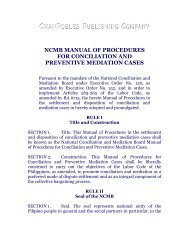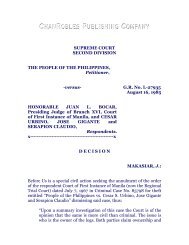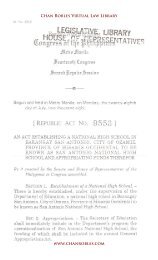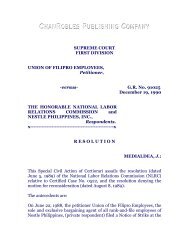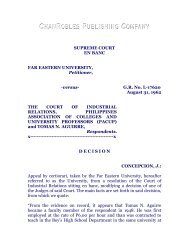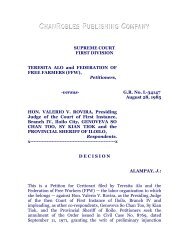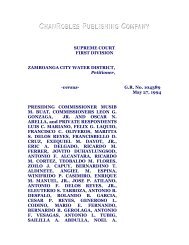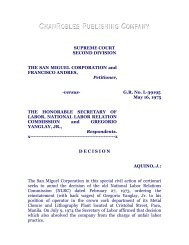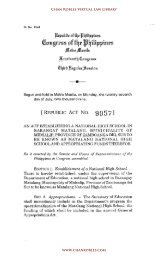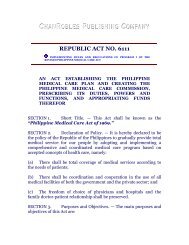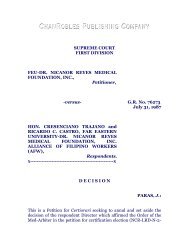Pre-Week Guide on Labor <strong>Law</strong> 2006 Bar Examinations Prof. Joselito Guianan <strong>Chan</strong>3. to violate a collective bargaining agreement. (Article 248 [i], Ibid.). Violation of theCBA is ULP only if gross in character which means flagrant <strong>and</strong>/or malicious refusalto comply with the economic provisions thereof. If not gross, violation of the CBA isno longer considered ULP.The act of the employer in refusing to comply with the terms <strong>and</strong> conditions of aCBA constitutes bargaining in bad faith <strong>and</strong> is considered an unfair labor practice.(National Development Co., vs. NDC Employees <strong>and</strong> Workers Union, 66 SCRA 181;Oceanic Pharmacal Employees Union vs. Inciong, G. R. No. L-50568, Nov. 7, 1979,94 SCRA 270).The act of the employer in refusing to implement the negotiated wage increasestipulated in the CBA, which increase is intended to be distinct <strong>and</strong> separate from anyother benefits or privileges that may be forthcoming to the employees, is unfair laborpractice. (Philippine Apparel Workers Union vs. NLRC, G. R. No. L-50320, July 31,1981; Alhambra Industries, Inc. vs. CIR, 35 SCRA 550).Refusal for a considerable number of years, to give salary adjustments accordingto the improved salary scales in the collective bargaining agreements, is unfair laborpractice. (Benguet Consolidated vs. BCI Employees <strong>and</strong> Workers Union, 22 SCRA1293).The act of the employer to permit non-union members to <strong>part</strong>icipate in theservice charges, contrary to the stipulation in the CBA, is unfair labor practice. (AlbaPatio de Makati, vs. Alba Patio de Makati Employees Association, G. R. No. L-37922,March 16, 1984)..ILLUSTRATIVE CASES INVOLVING UNFAIR LABOR PRACTICESOF EMPLOYERS.The following acts of the employer were generally held as unfair labor practice acts:1. The employer’s act of notifying through letters, absent employees individually during astrike following unproductive efforts at collective bargaining that the plant would be operated thenext day <strong>and</strong> their jobs were open for them should they want to return to work, has been held tobe an unfair labor practice, as an active interference with the right of collective bargainingthrough dealing with the employees individually instead of through their collective bargainingrepresentatives. (Insular Life Assurance Co., Ltd., Employees Association-NATU, vs. InsularLife Assurance Co., Ltd., G. R. No. L-25291, Jan. 30, 1971, 37 SCRA 244).2. Offer of reinstatement <strong>and</strong> attempt to “bribe” the strikers with “comfortable cots,”“free coffee <strong>and</strong> occasional movies,” “overtime pay” for work performed in excess of eight hours<strong>and</strong> “arrangements” for their families, so they would ab<strong>and</strong>on the strike <strong>and</strong> return to work,constitute strike-breaking <strong>and</strong> union-busting which is unfair labor practice. (Ibid.).3. Offer of a Christmas bonus to all “loyal” employees of a company shortly after themaking of a request by the union to bargain; wage increase given for the purpose of mollifyingemployees after the employer has refused to bargain with the union, or to induce strikers to returnto work; employer’s promise of benefits in return for the striking employees’ ab<strong>and</strong>onment oftheir strike; <strong>and</strong> the employer’s statement, made about six (6) weeks after the strike started, to agroup of strikers in a restaurant that if the strikers returned to work, new benefits such ashospitalization, accident insurance, profit-sharing <strong>and</strong> a new building to work in, will be given tothem. (Ibid.).4. The act of the employer in indirectly forcing its employees to join another union.(Macleod vs. Progressive Federation of Labor, 97 Phil. 205).5. The act of the employer in instructing an employee not to affiliate or join a union.(Visayan Stevedores vs. CIR, 19 SCRA 426; National Fastener Corporation vs. CIR, 1 SCRA 17).6. The act of the employer in interrogating its employees in connection with theirmembership in the union or their union activities, which hampers their exercise of free choice.(Scoty’s De<strong>part</strong>ment Store vs. Micaller, 99 Phil. 762; Philippine Steam Navigation Co. vs.Philippine Marine Officers Guild, 15 SCRA 174).7. The act of the employer in asking the union’s recruiter to surrender the unionaffiliation forms <strong>and</strong> threatening him with bodily harm. (Velez vs. PAV Watchmen’s Union, 107Phil. 689).24
Pre-Week Guide on Labor <strong>Law</strong> 2006 Bar Examinations Prof. Joselito Guianan <strong>Chan</strong>8. Withdrawal by the employer of holiday pay benefits stipulated under a supplementaryagreement with the union. (Oceanic Pharmacal Employees Union vs. Inciong, G. R. No. L-50568,Nov. 7, 1979).9. The act of the employer in refusing to reinstate strikers who voluntarily <strong>and</strong>unconditionally offered to return to work but did not accept the new discriminatory conditionsimposed against them because of their union membership or activities. (Cromwell CommercialEmployees <strong>and</strong> Laborers Union vs. CIR, G. R. No. L-19778, Sept. 30, 1964).10. The act of the employer in conducting espionage or surveillance of the meetings <strong>and</strong>activities of the union. Surveillance is illegal since it shows the opposition of the employer to theexistence of the union, <strong>and</strong> the furtive nature of his activity tends to demonstrate spectacularly thestate of his anxiety. (51A CJS Sec. 382, p. 278). When an employer engages in surveillance ortakes steps leading his employees to believe it is going on, a violation results because theemployees come under threat of economic coercion or retaliation for their union activities.(Henriz Manufacturing Co. vs. NLRB, 321 F 2d 00).11. Refusal of the employer to reinstate an employee who was illegally dismissed basedon the union security clause, unless the latter admits his guilt. (Litex Employees Association, vs.CIR, G. R. No. L-39154, Sept. 9, 1982; 116 SCRA 459).12. The act of the purchasers of a business establishment in replacing the union memberswho were negotiating a CBA with the old owner at the time of the sale. (National Labor Unionvs. CIR, G. R. No. L-31276, Sept. 9, 1982).13. The announcement by the employer of benefits prior to the conduct of a certificationelection, intended to induce the employees to vote against the union. (Re Louisiana Plastics, Inc.173 NLRB No. 218; NLRB vs. Exchange Parts Co., 375 U. S. 405).14. The grant of concessions <strong>and</strong> privileges during the pendency of certification electioncase to members of one of the unions <strong>part</strong>icipating therein. (Philippine Charity SweepstakesOffice, vs. The Association of Sweepstakes Staff Personnel, G. R. No. L-27546, July 16, 1982).15. The act of the employer in suspending union officers who attended the hearing in thepetition for certification election they filed. (CLLC E. G. Gochangco Workers Union, vs. NLRC,G. R. Nos. 67158-62, May 30, 1988).16. The uneven application by the employer of the company’s marketing plan whichcaused undue hardship to the president <strong>and</strong> vice president of the union. (AHS/PhilippineEmployees Union vs. NLRC, G. R. No. 73721, March 30, 1987).17. The act of the employer in ceasing its operation due to establishment of the union.The determination to cease operations is a prerogative of management that is usually notinterfered with by the State as no business can be required to continue operating at a loss simplyto maintain the workers in employment. That would be taking of property without due process oflaw which the employer has a right to resist. But where it is manifest that the closure is motivatednot by a desire to avoid further losses but to discourage the workers from organizing themselvesinto a union for more effective negotiations with the management, the State is bound to intervene.(Carmelcraft Corporation vs. NLRC, G. R. Nos. 90634-35, June 6, 1990; Sy Chie Junk Shop vs.Federacion Obrero de la Industria, G. R. No. 30964, May 9, 1988).18. Simulated sale in bad faith of business, resorted to merely to get rid of the employeeswho were members of the union. (Moncada Bijon Factory vs. CIR, 4 SCRA 756; Cruz vs.PAFLU, 42 SCRA 68; National Labor Union vs. CIR, 116 SCRA 417).19. The act of the employer in engaging in capital reduction to camouflage the fact that ithad been making profit, in order for it to be able to effectuate the mass lay-off of union members.(Madrigal & Co., Inc. vs. Zamora, G. R. No. L-48237, June 30, 1987, 151 SCRA 355).20. The retrenchment of employees who belong to a <strong>part</strong>icular union, with no satisfactoryjustification why said employees were singled out. (Bataan Shipyard <strong>and</strong> Engineering Co., Inc.,vs. NLRC, G. R. No. 78604, May 9, 1988).21. The act of the employer in asking the employees to disclose the names of themembers of the union. (Samahan ng Manggagawa sa B<strong>and</strong>olino-LMLC vs. NLRC, 275 SCRA633 [July 17, 1997]).22. The act of the employer in putting on “rotation” only the alleged members of theunion. (Samahan ng Manggagawa sa B<strong>and</strong>olino-LMLC vs. NLRC, 275 SCRA 633 [July 17,1997]).23. The act of the employer in compelling employees to sign an instrument indicatingthat the employer observed labor st<strong>and</strong>ards provisions of law when he might have not, togetherwith the act of terminating or coercing those who refuse to cooperate with the employer’sscheme. (Mabeza vs. NLRC G. R. No. 118506, April 18, 1997, 271 SCRA 670).24. An apprehension that there might be a future strike in the school is not a ground fordismissal of teachers who have attained permanent status. This is an unwarranted interference25


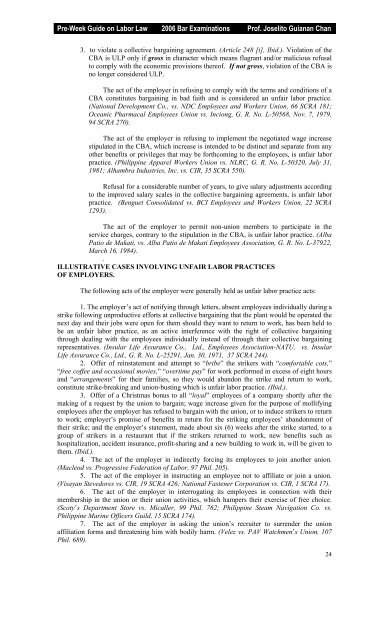
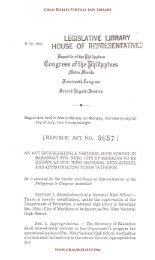
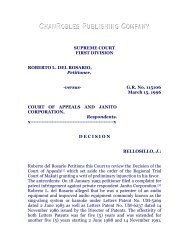
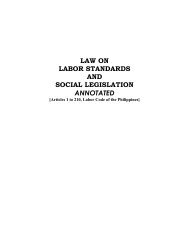
![Aurelio vs. NLRC, (221 SCRA 432 [1993]) - Chan Robles and ...](https://img.yumpu.com/51280528/1/190x245/aurelio-vs-nlrc-221-scra-432-1993-chan-robles-and-.jpg?quality=85)
